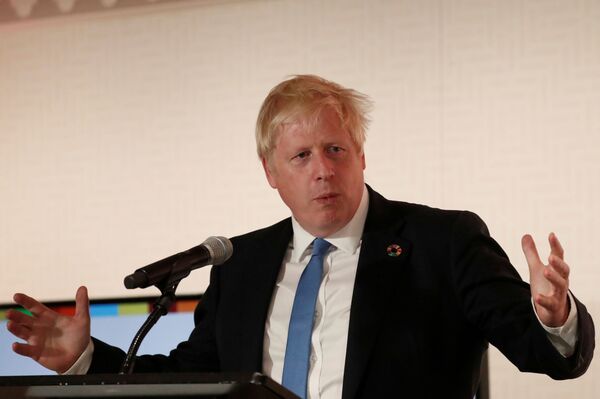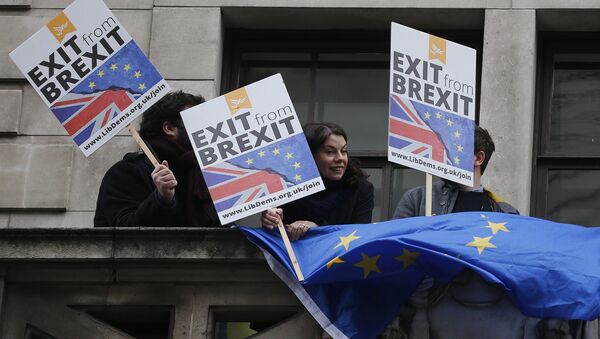As UK Prime Minister Boris Johnson is on a “do or die” mission to deliver his pledge to take his country out of the European Union by the 31 October deadline, it is reported that Brussels has reacted with dismay to the PM’s new plan for the Irish border, writes The Guardian.
The European Commission is said to have also rejected the secretive “tunnel” talks Johnson had held out hopes for before a crunch summit on 17 October to deliver a breakthrough deal.
Johnson’s Alternative to Irish Backstop
UK Prime Minister Boris Johnson’s new Brexit proposal, presented in Brussels on Wednesday, involves Northern Ireland leaving the EU’s customs union at the end of transition along with the rest of the UK, necessitating checks and controls on the island of Ireland.
Northern Ireland would remain aligned with EU standards on goods if the Northern Ireland Assembly (Stormont) agreed by December 2020, the end of the transition period, and then in a vote every four years.
The UK has also requested that both sides commit at the treaty level “never to conduct checks at the border”, even if Stormont vetoes the arrangements laid out in the new 44-page Irish protocol.
EU Chief Brexit negotiator Michel Barnier is reported to have criticised this commitment as preventing Brussels from protecting its internal market if the Northern Ireland assembly blocked the arrangement in 2020 or later.
“The EU would then be trapped with no backstop to preserve the single market after Brexit,” he is believed to have warned, according to sources.
While Barnier has yet to officially make a comment, UK Brexit Secretary Steve Barclay has said the EU negotiator recognised these were serious proposals.
During a phone call with the UK prime minister, European Commission president Jean-Claude Juncker is believed to have underscored risks involving a Stormont veto in Johnson’s plans for the Irish border, pointing out that arrangements designed to “keep the peace” could unravel in months.
Ireland's Taoiseach (prime minister) Leo Varadkar is said to have warned Prime Minister Johnson in a phone conversation on Wednesday that the tabled suggestions “do not fully meet the agreed objectives of the backstop”.
The Guardian writes that the European parliament’s Brexit steering group is believed to say on Thursday that MEPs will not vote in support of the newly-proposed UK deal.
The group’s coordinator, Guy Verhofstadt, told reporters after a briefing from Barnier:
“The reaction of the Brexit steering group was not positive. Not positive in that we don’t think really there are the safeguards that Ireland needs.”
Reports point to EU sources highlighting flaws in the UK’s proposals that have made it unlikely an agreement could be hammered out before the crunch EU summit on 17 October, with a diplomatic source allegedly saying:
“Unfortunately we are heading for an extension.”
What Comes Next?
Under the Benn Act, Boris Johnson will be instructed to request a Brexit extension if a deal is not passed by parliament by 19 October.
In his speech addressing a Tory Conference in Manchester, the prime minister lashed out at parliament for seeking to block Brexit, and warned the EU of his determination to take Britain out of the EU on 31 October, with or without a deal.
Boris Johnson will seek to suspend parliament again next week, reported the publication.
The move would allow for a Queen’s Speech to take place on 14 October, ahead of the crucial EU summit on 17-18 October.
This comes after the UK Supreme Court ruled the prime minister’s decision to prorogue parliament for five weeks was unlawful, forcing Johnson to fly back early from the UN General Assembly in New York.

According to government sources, a statement to MPs is anticipated from Boris Johnson or Steve Barclay, the Brexit secretary, following which parliament is expected to be suspended next Tuesday.
Boris Johnson has been quoted as saying he intends to “deliver on the people’s priorities”:
“Through a Queen’s Speech, the government will set out its plans for the NHS, schools, tackling crime, investing in infrastructure and building a strong economy.We will get Brexit done on 31 October and continue delivering on these vital issues.”


